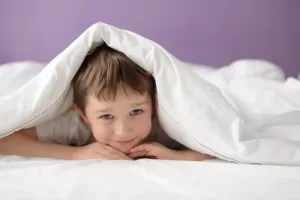Bedwetting- causes and treatment
What is enuresis?
Enuresis (or nocturnal enuresis) is more commonly known as bedwetting. It’s a problem for lots of children, and can have an impact on the entire family, causing upset, disrupted sleep and embarrassment for kids as they get older. Though it can be frustrating, it’s important not to blame a child for bedwetting, as whatever the underlying reason for the problem, it’s likely they have no control over it.
How common is bedwetting?
Around a third of 4 year olds still wet the bed. By the age of 6, this falls to around 10%, and by the age of 10 it drops further to 5%. However, in some cases it can continue into teenage years. There may be phases when a child becomes dry at night, and then starts to wet the bed again- however, over time they will usually improve. Bedwetting is generally more common in boys.
When should you see a doctor about it?
- If child is 5 years old or older and is bedwetting regularly
- If it’s causing a lot of upset or stress in the family
- If bedwetting starts suddenly in a child who has been dry by night for 6 months or more
- If a child has other symptoms with their bedwetting such as abdominal pain, fevers, excessive thirst, weight loss, constipation, urinary symptoms by day (increased frequency of urination, burning when passing urine, urgency)
- If the child has behavioural issues or a learning disability
What causes bedwetting?
In most children who wet the bed, there is no underlying medical or psychological condition. However the following issues may be factors:
- A failure to waken in response to a full bladder.
- A small functional bladder capacity- usually a normal sized bladder, but they sense their bladder is full before it truly is. They may also have urinary frequency and urgency by day.
- In many cases there will also be a family history- it’s an issue that tends to run in families.
Your doctor will usually ask some questions and may do some tests to rule out less common underlying causes such as
- constipation – a build up of faeces in the bowel may cause pressure on the bladder that stops it filling and emptying properly and may also disrupt nerve signals between the bladder and the brain.
- urinary tract infection- this can cause bedwetting in a child who was previously dry by night. There may be also be a fever, abdominal or back pain, discomfort when passing urine and sometimes an odour from the urine.
- Type 1 Diabetes – symptoms may include bedwetting in a previously fully toilet-trained child, as well as excessive thirst, weight loss, and generally passing more urine than usual. There may also be a fruity or nail varnish-like smell off the breath.
- a neurological (nerve) problem- any condition that results in damage to the nerves supplying the pelvis can lead to continence problems. The child may also wet themselves by day and have issues with faecal incontinence.
- stress or emotional upset may cause children who were previously toilet-trained to start wetting the bed again. Triggers can include a house move, or a new school. Children who are victims of abuse (including sexual abuse) may also present with bedwetting.
What’s the best treatment for enuresis?
This depends on the symptoms.
- Bedwetting alarms are often very effective if deep sleep is a major factor. 2 out of 3 children will become dry with this approach, though it can take a few months to work. A rubber mat is placed in the bed, and an alarm will sound if it becomes wet overnight. Over time, this helps the child to form an association between urinating and waking.
- A GP or paediatrician may also suggest a trial of a medication, which can help children who tend to produce a lot of urine at night.
- Good fluid intake is recommended throughout the day, though it may be appropriate to avoid fizzy drinks or caffeinated drinks like hot chocolate, tea or cola in the evenings, as they can exacerbate an already overactive bladder.
- It’s very important that parents and siblings continue to offer support and encouragement to the child- punishing or criticising for lack of progress may make matters worse.
- If there are daytime symptoms, behavioural issues or if the child also has a learning disability, your GP may recommend referral to a paediatrician at the outset.
If you have further questions about enuresis, speak to your GP or paediatrician.

Getting a Mental Health Care Plan in Australia: Your Guide
Getting a Mental Health Care Plan in Australia: Your Guide Mental health matters—and if you’re feeling overwhelmed, anxious, or down, a mental health care plan can help. But what is it, and how do [...]
UTI Symptoms and Treatment: What You Need to Know
UTI Symptoms and Treatment: What You Need to Know Urinary Tract Infections (UTIs) are common, uncomfortable, and often disruptive. But what exactly are the signs to watch for, and how can you get relief [...]
Free Mental Health Care Plan Online | Bulk-Billed by Qoctor
Free Mental Health Care Plan Online | Bulk-Billed by Qoctor Discover how to get a free, bulk-billed Mental Health Care Plan (MHCP) in Australia through Qoctor's telehealth service. Accessing [...]





